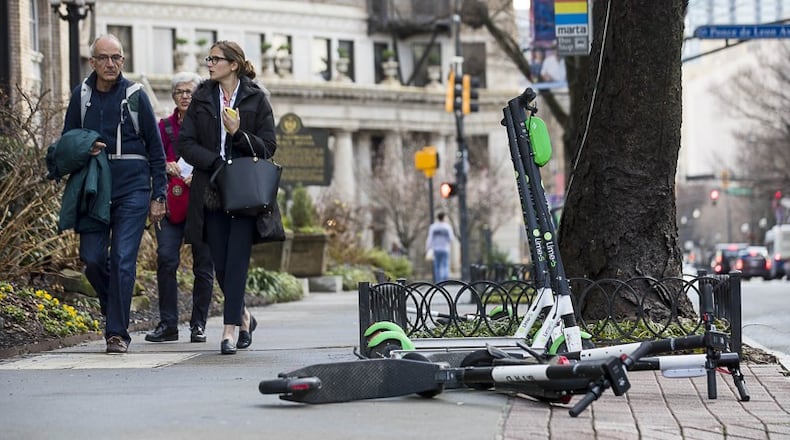The city of Atlanta will collect at least $200,000 in outstanding scooter impound fees by the year’s end, Atlanta’s Department of Transportation Commissioner Josh Rowan announced.
“We don’t want this to linger because it’s clouding the conversation around the future of micro-mobility in the city,” he said, speaking to the city’s transportation committee on Wednesday.
The move comes weeks after The Atlanta Journal-Constitution reported that the city was releasing impounded scooters back to the companies without collecting the fees. The AJC also reported that the companies were complaining to the city about receiving incorrect or incomplete invoices from the city for the impounded devices.
On Nov. 12, the city began impounding scooters and refusing to give them back to companies until they payed the fees, the AJC previously reported. There were 584 scooters in the city’s possession as of Wednesday, according to Rowan.
RELATED COVERAGE:
Scooter companies met with the Rowan earlier this week to discuss a plan to collect fees, but details were not revealed at Wednesday’s meeting. The city did not make Rowan available for comment after the meeting.
Rowan also stated he will be the primary point of contact as the city works through its scooter issues. Scooter regulation has been divided between the City Planning and Public Works departments, that latter of which collects illegally parked scooters and impounds them.
“If it is a transportation issue, it’s just going to come to me,” he said. “The burden is on me to work with the appropriate departments.”
The city has been looking to update its existing scooter legislation and gathered resident input for that process through an online survey. Preliminary findings show residents want safer places for scooters to ride, and a reduction in the number of companies operating in the city. There are seven scooter companies currently operating in Atlanta.
Councilman Andre Dickens, who chairs the committee, said it’s still possible legislation could come in the early part of the year and will likely focus on reducing the number of scooters in the city. The city will likely put out a request for proposals to limit the number of scooter companies, an idea that has been discussed before.
Updated scooter legislation is likely to come in mid 2020, according to an updated legislation timeline presented at the meeting.
There is also a possibility scooter contracts could be extended if legislation doesn’t come before many of them expire in February, Dickens said.
While a flow chart has not been provided on the city’s scooter impound process, Dickens hopes there is no confusion on the part of scooter companies going into next year: “I want it to be clear across the board [so] that they understand the process.”
About the Author
Keep Reading
The Latest
Featured

